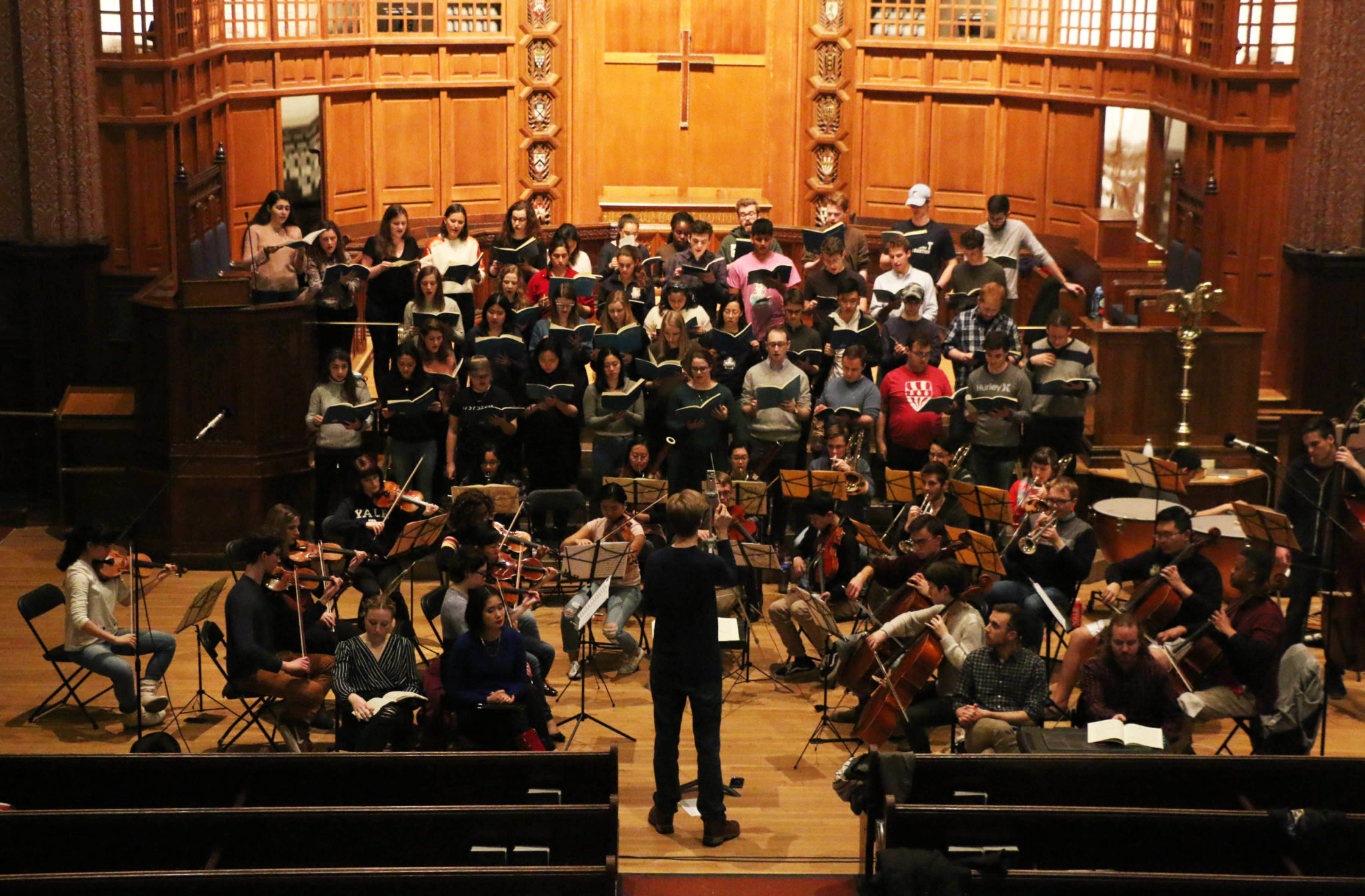
Sofia Laguarda
A nearly 100-person ensemble will deliver a musical production on Friday consisting of Mozart’s “Requiem” in Battell Chapel.
As a part of his senior thesis, Sam Hollister ’18 will take on the role of conductor and music director, alongside Claire Carroll ’18, who is both the producer and a member of the ensemble. Sofia LaGuarda ’20 and Emery Kerekes ’21 also hold significant roles in the production, as assistant producer and assistant music director, respectively. The production — which will take place in Battell Chapel on Friday at 8 p.m. — features primarily students.
“That was such an amazing and incredible privilege to be able to walk through Battell and listen to people sing because I said ‘sing this,’” Hollister said of a rehearsal. “It’s such a huge blessing to be able to do this.”
Hollister repeatedly called the production “mammoth,” describing the yearlong process of bringing the production to fruition as a difficult but worthwhile feat.
Hollister and Carroll reminisced about the early conceptions of the concert, dating back to a bus ride back from a Glee Club mini-tour during their sophomore year, and how the “Requiem” began as “totally a joke.”
“It seemed unfathomable at the time,” Hollister said. “[We thought], ‘There’s no way we’re doing the Mozart ‘Requiem.’”
The production has racked up more than 750 Facebook RSVPs. Hollister said he received help on the project from two of his faculty mentors, Glee Club Music Director Jeffrey Douma and Yale Symphony Orchestra Music Director Toshiyuki Shimada.
Shimada encouraged Hollister to pursue a production of the Mozart “Requiem,” after the two considered other possible orchestral and choir pieces. And Douma helped Hollister during rehearsals, assessing the balance of the sounds in Battell and offering Hollister other musical advice.
Hollister said his performance will not be “some avant-garde, going-against-the-norm project.” While conductors generally agree on some aspects of the original work, there is debate over some of the details, partly because Mozart died in the middle of composition, leaving “a lot of things grossly incomplete,” Hollister said.
Hollister will perform a rendition of the Mozart “Requiem” completed by Franz Xaver Süssmayr. This version was completed within a year of Mozart’s death, and Süssmayr “worked with [Mozart] a bit as a copyist and knew some of his ideas and intentions,” Hollister said.
However, perhaps the most unconventional aspect of this performance of the “Requiem” lies in the makeup of the performers themselves.
“One thing that’s really cool about the project musically is that we have singers and musicians from all different places,” Carroll said. “We have a range of people, but it’s all coming together in nice ways.”
The orchestra and choir are predominantly undergraduates, but many graduate students and professionals have offered to help the group. Hollister said he likes the idea that the production has “representation from all four corners of the Yale musical world.”
Speaking from her own experience working under Hollister’s baton, Carroll said he has a “good sense of what a rehearsal needs” because it is not only hard to “wrangle 70 singers and have them stay focused for two hours” but it is also difficult to incorporate a unique approach that caters to “singers at different levels of musicality.” She also commended Hollister’s ability to “bring everyone to the same very high place” despite differences among the singers in level and experience.
Fostering a community among members of the production was a priority for Hollister and Carroll early in the process. Coming from social musical spaces, such as the Glee Club, the two organized dinners and a screening of the movie “Amadeus,” to ensure that those not actively involved in Yale’s music community would feel included in the social sphere.
“For me, if I can keep making and facilitating musical spaces, I will be happy,” Carroll said.
Over the years, Hollister and Carroll have established themselves as a successful musical duo. Last year, the pair performed a rendition of Rachmaninoff’s “All-Night Vigil,” and while that involved a similarly arduous creative process, the collaboration allowed the two to one-up themselves with this year’s production of the “Requiem.” However, their friendship and musical companionship may not be limited to their undergraduate experience. Asked to describe their post-graduation plans, the two seniors said they’ve been toying with the idea of starting an orchestra together in Hollister’s hometown of Jamestown, Rhode Island.
But for now, Hollister is focused on the Mozart “Requiem.” Throughout the process, Hollister has not only learned to be more comfortable as a music director, but also gained valuable experience balancing a comfortable and healthy musical environment with high musical standards. He said he hopes people will leave the production feeling like they can do anything.
“I’m excited to sing it,” Carroll said.
“I’m excited to wave my arms to it,” added Hollister.
Allison Park | allison.park@yale.edu







